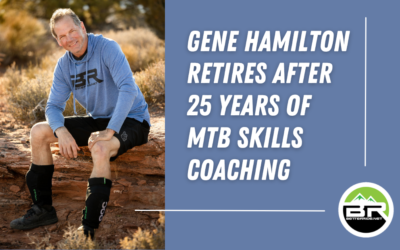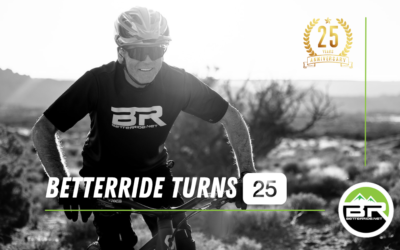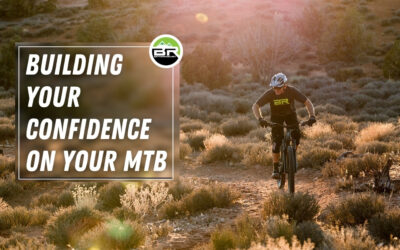I have gotten a lot of emails about this tough mental process, and so far this year I have had two student cancellations because they injured themselves less than a week before their course.
I think this is an area where many people struggle, certainly for me I have had a mountain bike crash or two (okay more like 10) that affected my performance for months. Years ago, in my downhill racing days, I crashed hard and really shook myself up.
My come-back ride (my first ride after three weeks off the bike) was downhill practice at a race. I was a little worried that I might not be completely healed and didn’t want to re-injure myself. With this mindset, I was thinking and focusing on not falling!
Those of you that have taken a course from me know that I stress focusing on what you want to do, not what you don’t want to do. Well, after two sketchy runs I realized what I was doing!
My focus on NOT FALLING was hurting my confidence and making me focus on falling (the brain has to switch from “falling” to “not fall”). I switched my focus to “RIDE MY BEST AND HAVE FUN” (which has nothing to do with falling) and my next three runs got better and better each time.
This is a crucial step in coming back. It may be hard, but you must focus on what you WANT to do, which is ride your best. Focusing on what you DONT want to do keeps you focused on a possible negative outcome. This only continues to depress your confidence.
This is a vicious cycle that is hard to break out of. If you can’t focus on what you want to do you shouldn’t ride! Seriously, if you can’t ride with confidence you are going to get hurt. Take another day/week/month off until you can come back with confidence.
“I have failed a lot more times than I have succeeded”
That piece of wisdom comes from Michael Jordan. I will certainly agree with that. In my fourteen years as a pro racer, I only won two races. At the NORBA Nationals in the 1990’s only the top 70 pros qualified for the final, I finished 71 in the qualifiers four times and 72nd twice, ouch!
In 2003 I had a frame snap in half while doing about 30 miles an hour at Angel Fire. That really hurt. I had four broken ribs and the wind knocked out of me. Events like these can quell your desire to ride or fire you up to learn from the event and try harder.
How you deal with adversity is up to you. I will give you some ways to overcome injuries and/or frustrating experiences and use them to become stronger.
Crashes, setbacks, and mistakes are part of the learning process and can actually be a big step towards improving. The first thing to do is find the cause of the setback and determine if you were at fault or not.
In the frame-breaking incident, I was definitely not at fault but in the races where I qualified 71st, I was at fault. As my friend and fellow competitor Alex Morgan said, “Gene, for guys like us the qualifier is the race”.
He said this because he saw me coast the last straight into the finish (to save energy for the final run) and two or three pedal strokes were all I needed to have finished in the top 70 and gotten a final run. Easy fix, next race treat the qualifier as a race and do my best.
If the mistake/crash was your fault fix the problem and then tell yourself, “well I fixed that problem, that will never happen again” and go back to having fun. If you crashed because you were over-trained, get some rest and prepare with more recovery for your next ride or race.
If your mistake happened because you lost focus (the most common cause of wrecks), meditate and/or use imagery to improve your focus. Find reference points to keep your focus in that section of the course.
Both of the comebacks strategies above require reprogramming of both the conscious and subconscious brain. You have to literally replace fear with confidence using repeated logical reasoning to overwhelm your negative thought pattern.
Sometimes it is a series of mistakes that shakes your confidence or it just seems like dumb luck, such as when you crest a hill and a big rock has rolled into your line. You see the rock but it is too late to change your line so you hit it and flip over.
I hurt my leg pretty badly when this happened to me in Big Bear a few decades ago. To overcome this fall I used a combination of therapies, I used a “past history search” and imagery to rebuild my confidence.
A “past history search” is simply remembering the times you rode successfully and confidently. When you won the spelling bee, conquered “widowmaker hill” for the first time, finished your first race, won for the first time, etc. This will restore your confidence and really make you feel good about yourself.
I did this, then visualized riding the drop where I flipped over at Big Bear. In all my previous runs I had nailed that drop so I “rewound” my imagery and played the wreck over in my head.
The first couple of times I visualized cresting the hill, seeing the rock and flipping over, but then tucking and rolling without getting hurt. This made me feel a little better and more relaxed. Then I imaged seeing the rock, steering around it, and making that section of trail and could feel my body relax and my confidence start to return.
A past history search is also a great confidence booster anytime you are feeling down, no matter what the cause. Stand on the side of the trail or sit back in a comfortable chair, close your eyes and relive your best moments.
How do you get your confidence back quickly, in the middle of a ride or race? With a state change, forcing a smile, puffing out your chest out, clapping your hands together and standing tall are simple ways that help regain confidence quickly.
Positive self-talk helps too, “that wasn’t like me, I am a skilled rider. I have been riding really well, I am going to get back on my bike and ride like I own the trail!” These two methods combined can be very powerful.
Set yourself up for quick mental comebacks by creating and anchoring a performance cue. This is a proactive and powerful way to control your confidence and help you quickly overcome setbacks.

BetterRide student Jen Hanks knows about coming back from a setback, she came back from cancer!
A performance cue is a short phrase and/or physical action (such as touching your thumb and middle finger together) that is associated (anchored) with a physiological state, feeling or emotion. When I was racing my phrase to bring my confidence back was, “who is the King?” and I would touch my thumb and index finger together as I said that phrase.
To anchor a performance cue you use a “past history” as mentioned above and add a few steps. Sit back in a comfortable chair, close your eyes and relive your three most confident events/moments of your life.
Feel your face flush as you can’t hold back a happy, satisfied grin, truly relive those moments. When you are feeling positive, confident emotions created by reliving these moments “anchor” those emotions by doing the physical action you have chosen and/or repeating the short phrase you picked.
With repetition, you will anchor the feeling so strongly that by simply saying your phrase and/or doing your performance cue you immediately enter the state that you have anchored.
Lastly, if you aren’t injured, remember to laugh, you are human, you make mistakes, big deal. Marla Streb put it best when I was trying to console her after she had a poor performance. She said, “Gene, it’s only a bike race, it not like we are saving lives”. That is a good perspective.
“A champion isn’t someone who wins all the time. A Champion is someone who can suffer great adversity and come back to win again”
Yes, no matter which of the above methods you use, it will take work, but all things worth having (like peace of mind) require work. Knowledge is worthless without action!
Create a strong return to form!
Please share this article with anyone you feel may benefit from this and add your comments below.
Cheers,
Gene





Someone once told me, probably you Gene, that “the most crucial athletic training takes place at the 8 inches above one’s shoulders.” The head game is the game for most of us that are mediocre athletically on our best day out to enjoy the sport. Coming back from an injury or correcting mistakes, or learning a new skill requires the head work that Gene describes the best of any teacher whom I’ve ever studied. Thanks for another terrific article.
Thanks, Fred! I’ll keep writing them!